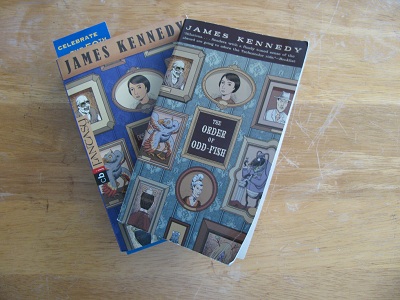It’s Sonderling Sunday! Have you ever laughed at the odd phrases tourist books choose to translate? Have you ever wondered how these words could possibly be used? On Sonderling Sundays, I take phrases from books for children and young adults and give you the German translation. Obviously, these phrases are useful: They have been used! I also hope you will enjoy a different way of hearing them or looking at them.
I’d like to think that even if you don’t speak German, you can enjoy Sonderling Sunday. In fact, with that in mind, I offer two challenges for the comments:
1) Please attempt to use one of the phrases or words from today’s post in a sentence.
2) Please translate one of the phrases or words into another language for all of our edification.
This week, I’m back to The Order of Odd-Fish, by James Kennedy. We left off on Chapter 11.
I like this sentence at the beginning, and thought it would be fun to see how it translates:
“Gone was the vast jeweled egg she’d woken up in every other morning of her life.”
This becomes:
Das riesige juwelenbesitzte Ei, in dem sie bisher jeden Morgen ihres Lebens aufgewacht war, war verschwunden.
(A literal translation is something like this: “The giant jewel-possessing egg, in which she up to now each morning of her life woke up to, was disappeared.”)
Some more intriguing phrases you never knew could be useful:
“scruffy wooden desk” = zerkratzten Holztisch
I like this one:
“a little arched leaded-glass window” = ein kleines Bogenfenster mit Bleiglas herein
This doesn’t change a lot, but I like the sound in German:
“She couldn’t get out of the crusty, stinky thing fast enough.” = Sie konnte gar nicht schnell genug aus diesem schmutzigen, stinkenden Ding herauskommen.
“in an agony of relief” = mit einer beinahe qualvollen Erleichterung
“wrapped in a fluffy white towel” = eingewickelt in ein flauschiges wei?es Handtuch
Here’s a phrase I dare you to use in a sentence:
“cars and elephants moving in the boulevards” = Wagen und Elefanten bewegten sich über die Boulevards
“Jo nearly spit out her coffee.” = Jo hätte sich fast an ihrem Kaffee verschluckt.
“painful” = sehr schmerzlich
“It was as if the ground had reeled under her.” = Jo hatte das Gefühl, als würde der Boden unter ihr schwanken.
“Just hearing it made her skin prickle.” = Es kribbelte sie am ganzen Körper, als sie dieses Wort nur hörte.
(“It tingled her on her whole body, when she this word only heard.”)
“jewelry box” = Schmuckkassette
“lead the life of a normal Odd-Fish squire” = lebe wie ein ganz normaler Knappe eines Seltsamen Sonderlings
“incredulous” = ungläubig
Well, I’m tired, so I’m stopping there for tonight. How about you? Can you think of a reasonable way to work one of these phrases or words or sentences into normal conversation? Or can you give us a translation in yet another language? I’ll be watching the comments to see.
